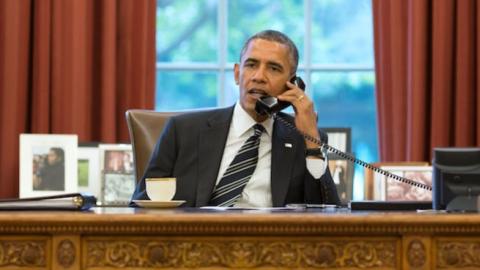Barack Obama’s foreign policy has always been defined by ticking the boxes the far Left long wanted ticked.
Now he’s contemplating one more, by far the most dangerous of all: unilateral nuclear disarmament, or at least a rough approximation thereof. After reducing the size of our nuclear arsenal to dangerous levels, the Washington Post reports that Obama is considering a “no first use” policy with regard to nukes.
Peaceniks around the world will cheer; the rest of us will shudder. No First Use (NFU) was first raised as a strategic doctrine by JFK in a March 1961 speech. (Truman and Eisenhower knew better.) But Kennedy quickly dropped the idea after the Cuban missile crisis proved that proclaiming, “We will never strike first in any conflict,” had only encouraged Khrushchev to act more boldly. It was also true that NFU encouraged the Russians to think that they could win an all-out war in Europe. If, for example, a conventional Russian invasion through the Fulda gap into West Germany was so massive that NATO forces couldn’t respond in time or with enough impact, the Russians would be assured of victory with the threat of American nukes off the table.
Other presidents agreed with Kennedy’s abandonment of NFU, and the doctrine lay dormant for the rest of the Cold War. Today, the arguments against it may be even more urgent. As American and NATO troop levels stagnate and Vladimir Putin assumes a more aggressive posture while refurbishing the Russian military, the threat of a nuclear strike may be one of the few ways left to keep Russia in check. After all, Putin himself talks about using nuclear weapons to hold onto Crimea and Eastern Ukraine, and his generals, meeting with American officials in March 2015, threatened to use nukes if NATO dared to reinforce the defenses of the Baltic states.
As General Sir Richard Shirreff, NATO’s deputy supreme allied commander from 2011 to 2014, said in a BBC Radio 4 interview, Russia has hardwired “nuclear thinking and capability to every aspect of their defense capability.” Renouncing first-use will only encourage Russia or another aggressor with nukes to strike first at what is perceived to be an opponent with one arm deliberately tied behind its back — and to target our nuclear assets so they can’t be used in retaliation. Far from diminishing the likelihood of a nuclear confrontation, then, it could actually trigger one.
Deterrence in war always depended on a degree of vagueness and uncertainty. It’s not so much what you will do in retaliation but what you might do that makes the would-be aggressor think twice — especially if he thinks you are ready and willing to do things that precipitate the all-out conflict both sides want to avoid.
This especially applies to China. China announced its own version of NFU in 1964, when it acquired its first nuclear weapon, but no one believed Beijing then, and there’s no reason to believe lip service it continues to pay to NFU today. China has been busy building up its nuclear arsenal in the past decade, along with the ballistic missiles to deliver them. It also has a very active biological- and chemical-weapons program, as does Russia. If China believes that in an escalating military confrontation in the South China Sea, the U.S. won’t use nuclear weapons unless attacked by Chinese nukes, what’s to prevent them from using their other unconventional arsenals in order to win? And what’s to prevent them, in that nightmare scenario, from using their nukes to finish the job?
The fact is that leaving the first-use option on the table has kept the peace among nuclear powers since World War II. The first and last country to have a nuclear weapon dropped on it, Japan, doesn’t want the U.S. to adopt NFU. Neither do South Korea or most of our NATO allies, many of whom share a dangerous border with Russia.
Yet breaking what works is Obama’s speciality — and liberalism’s. Reversing a six-decade-old policy would make an already uncertain and dangerous world even more uncertain and dangerous. But when has that ever stopped him before?
















